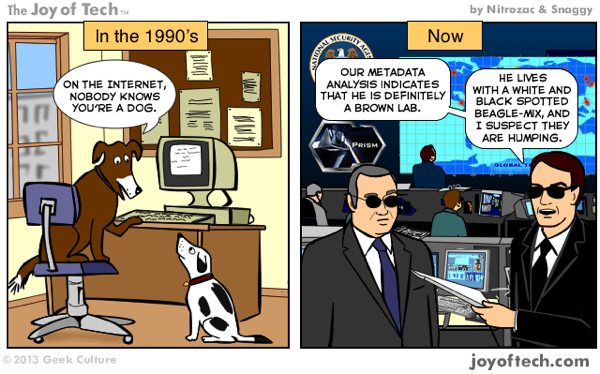There is a short clip of Edward Snowden speaking in Moscow on the occasion of receiving the Sam Adams Award, where he explains why the mass surveillance programs carried out by agencies like the NSA are actually making us less safe, not more.
Snowden, who faces espionage charges in the U.S. over the leak, described the techniques as “dragnet mass surveillance that puts entire populations under sort of an eye that sees everything even when it’s not needed.”
“They hurt our economy. They hurt our country. They limit our ability to speak and think and live and be creative, to have relationships and to associate freely,” Snowden said.
…Snowden said the U.S. government was “unwilling to prosecute high officials who lied to Congress and the country on camera, but they’ll stop at nothing to persecute someone who told them the truth.”
How true.
Thanks to reader Marcus Ranum,, I learned that the CIA issued a warning about Snowden back in 2009 when he was working for them that he was going into areas that he was not supposed to but that warning went unheeded.
The C.I.A. suspected that Mr. Snowden was trying to break into classified computer files to which he was not authorized to have access, and decided to send him home, according to two senior American officials.
But the red flags went unheeded. Mr. Snowden left the C.I.A. to become a contractor for the National Security Agency, and four years later he leaked thousands of classified documents. The supervisor’s cautionary note and the C.I.A.’s suspicions apparently were not forwarded to the N.S.A. or its contractors, and surfaced only after federal investigators began scrutinizing Mr. Snowden’s record once the documents began spilling out, intelligence and law enforcement officials said.
Their loss, our gain.


Wait what? Does this award have anything to do with a fine brewed beverage and if so where do I sign up.
Comic is hillarious, reality not so much.
PS Love your blog. keep up the good work.
The idea that the CIA “suspected” Snowden was trying to “break into classified files” yet did nothing about it is such a ludicrous lie that I can’t believe they actually think anyone with a brain would believe it for a second. That’s not how things work in the supersecret world of these nitwits. It’s nothing more than a stupid attempt to paint Snowden in an unflattering light -- again. At the very least he would never have been able to get a security clearance again.
Really? I don’t see how you can say that. I think you would need to assume the NSA to be at least somewhat competent. I find there to be a good amount of evidence that would suggest otherwise.
Where have I heard that story before…oh yeah! 9/11, when the FBI and others knew all about the hijackers and didn’t talk to each other. It seems the alphabet soup agencies are still as incompetent as they ever were. Does anyone believe they are really capable of stopping another high-level terrorist attack?
I recently heard an aggressive interview on the BBC with someone from The Guardian, in which the main line of attack (the Government and security services have been claiming the paper is damaging British security against terrorists) was “How can you be sure you’ll be able to keep the stuff Snowden gave you secure?” (I paraphrase). I was urging the interviewee to point out that the one organization that has proved it could not keep this particular data secure is the NSA -- one could add those organizations who passed data to the NSA, such as the UK’s own GCHQ; but they never did, at least in what was broadcast.